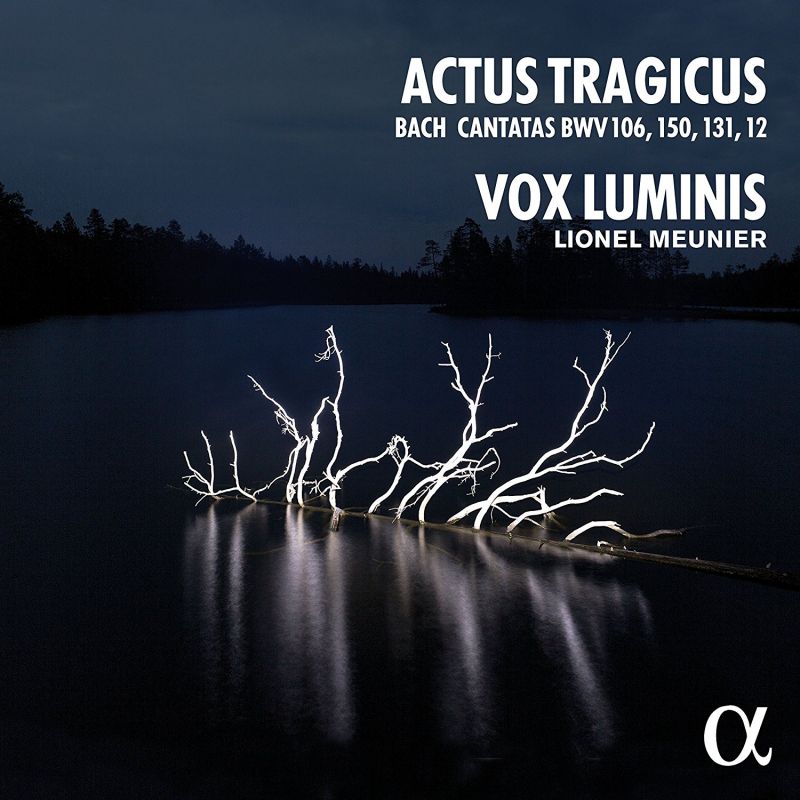JS BACH Cantatas BWV 12, 106, 150 &131
View record and artist detailsRecord and Artist Details
Composer or Director: Johann Sebastian Bach
Genre:
Vocal
Label: Alpha
Magazine Review Date: 02/2017
Media Format: CD or Download
Media Runtime: 84
Mastering:
DDD
Catalogue Number: ALPHA258

Tracks:
| Composition | Artist Credit |
|---|---|
| Cantata No. 106, 'Gottes Zeit ist die allerbeste Z |
Johann Sebastian Bach, Composer
Johann Sebastian Bach, Composer Lionel Meunier, Conductor Vox Luminis |
| Cantata No. 150, 'Nach dir, Herr, verlanget mich' |
Johann Sebastian Bach, Composer
Johann Sebastian Bach, Composer Lionel Meunier, Conductor Vox Luminis |
| Cantata No. 131, 'Aus der Tiefen rufe ich, Herr, z |
Johann Sebastian Bach, Composer
Johann Sebastian Bach, Composer Lionel Meunier, Conductor Vox Luminis |
| Cantata No. 12, 'Weinen, Klagen, Sorgen, Zagen' |
Johann Sebastian Bach, Composer
Johann Sebastian Bach, Composer Lionel Meunier, Conductor Vox Luminis |
Author: Jonathan Freeman-Attwood
These intimate pieces allow Lionel Meunier and his ensemble to exhibit their distinguished Schützian credentials in music both embracing and departing from the motet models Bach inherited from his forebears. Vox Luminis live up to their name with clear, soft textures redolent of 17th-century devotional rhetoric. At their best, such as the range of puckish to sober in the bassoon-orientated lines in No 150, the single voices and instruments constitute a remarkably crystalline landscape. Emotional restraint also offers some ear-pricking moments: the last movement of Nach dir brings Brahms’s reference to the movement in his Fourth Symphony closer than ever, and the equivalent point in No 131 affectingly accentuates Bach’s poignant oboe-writing.
Yet what ultimately frustrates in this recording is the avoidance of muscular engagement at any stage. The music tends to waft, albeit stylishly, as if observing proceedings from a safe distance. This is surely music of visceral as well as meditative moment? The opening of Aus der Tiefen (No 131) is a case in point, where tidy and inert exchanges belie Bach’s heart-wrenching commentary begging God to lift us out of the depths into the lap of mercy. Likewise this reading of the Actus tragicus (No 106) reduces the opening to a bland canvas of pointed objectivity: those bitter-sweet viols and recorders portray none of the rhythmic elasticity and suspended animation of the finest performances.
The vocal delivery is mixed, especially when exposed to Bach’s already demanding coloratura, and it’s mainly very straight-toned. The effect can verge on the apologetic, as in a surprisingly retiring ‘Ich folge’ from No 12. The overall impression is one of music-making that fails to plumb the depths of these wonderful lamentations.
Discover the world's largest classical music catalogue with Presto Music.

Gramophone Digital Club
- Digital Edition
- Digital Archive
- Reviews Database
- Full website access
From £8.75 / month
Subscribe
Gramophone Full Club
- Print Edition
- Digital Edition
- Digital Archive
- Reviews Database
- Full website access
From £11.00 / month
Subscribe
If you are a library, university or other organisation that would be interested in an institutional subscription to Gramophone please click here for further information.




